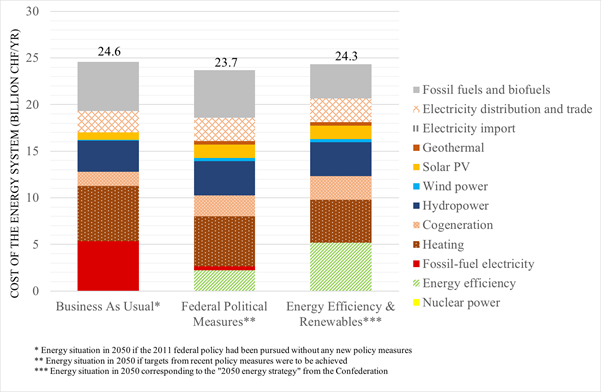Laboratories at the École Polytechnique Fédérale de Lausanne (EPFL) joined forces to compare three energy transition scenarios for Switzerland based on varying levels of fossil fuels and renewable energy, as well as different degrees of energy efficiency, to establish their financial impact.
Researchers concluded the higher the share of renewable energy and the greater the energy efficiency, the more jobs would be created and that energy independence could be improved and energy-related savings increased.
The study compared Switzerland’s 2011 energy policy – if still in force until 2050; a later revised version of the policy if all its targets were met; and the 2050 Energy Strategy that passed a public referendum in May 2017, and which has been in force since the start of this year.
The third, “new energy policy” scenario turned out to be the best in terms of Switzerland’s energy independence. The use of locally sourced renewable energy – such as solar, wind, hydro and wood-based power – combined with an improvement in the energy efficiency of cars and buildings, would result in a sharp decrease in energy imports such as heating oil, gasoline, diesel and natural gas. The country’s energy independence would increase from 26% today to around 72% by 2050 under the third scenario. Under the second scenario, in which the Federal Council's energy measures are brought in, the level would increase to just 46%. Unsurprisingly, Switzerland’s energy independence would remain at 26% under the first, “status quo” scenario.
The researchers made their analysis using energyscope.ch, an online calculator developed by EPFL's Energy Center and the Industrial Process and Energy Systems Engineering (IPESE) laboratory.
The results showed there would be 35% more jobs in Switzerland’s energy-related sectors under the “new energy policy” than in the other two scenarios. “This is mainly because new measures to increase energy efficiency would create jobs, particularly when it comes to building renovation, where a large part of the value added would be generated by local companies in Switzerland,” says Professor Philippe Thalmann, from Lausanne's Laboratory for environmental and urban economics (LEURE). “The other scenarios rely more heavily on fuel imports, which would account for a larger proportion of costs and produce fewer jobs locally.”
Popular content
The scientists found that while there would be an increase of transport sector jobs under the new energy policy scenario – due to higher demand for public transport – a larger share of electric vehicles on the road could offset the gain, as EVs require less maintenance.
The costs of energy generation under all three scenarios remained roughly the same, with the investments needed to achieve alternative scenarios varying by less than 10%.
“This is not really all that surprising,” says Professor François Maréchal, from the IPESE lab. “Renewable energy, coupled with greater energy efficiency, would of course require additional investment. But this would be offset by the decrease in fuel imports. On top of that, renewable energy – and especially photovoltaic solar power – and energy-efficient solutions like electric cars will keep getting cheaper.”
The latest version of the 2050 Energy Strategy proposes Switzerland’s five nuclear reactors be decommissioned after their safe operation time has ended. When that date is reached, however, is not clear. A decommissioning date has not been mentioned and it is Swiss nuclear power monitoring body ENSI that decides when a reactor's safe operation time has expired. The country's reactors were commissioned between 1969 and 1984. Switzerland’s nuclear power plant operators want to extend the operational time of the final plant to 2045 but other estimates assume a nuclear phase out will be completed within 10 to 15 years.
This content is protected by copyright and may not be reused. If you want to cooperate with us and would like to reuse some of our content, please contact: editors@pv-magazine.com.



By submitting this form you agree to pv magazine using your data for the purposes of publishing your comment.
Your personal data will only be disclosed or otherwise transmitted to third parties for the purposes of spam filtering or if this is necessary for technical maintenance of the website. Any other transfer to third parties will not take place unless this is justified on the basis of applicable data protection regulations or if pv magazine is legally obliged to do so.
You may revoke this consent at any time with effect for the future, in which case your personal data will be deleted immediately. Otherwise, your data will be deleted if pv magazine has processed your request or the purpose of data storage is fulfilled.
Further information on data privacy can be found in our Data Protection Policy.